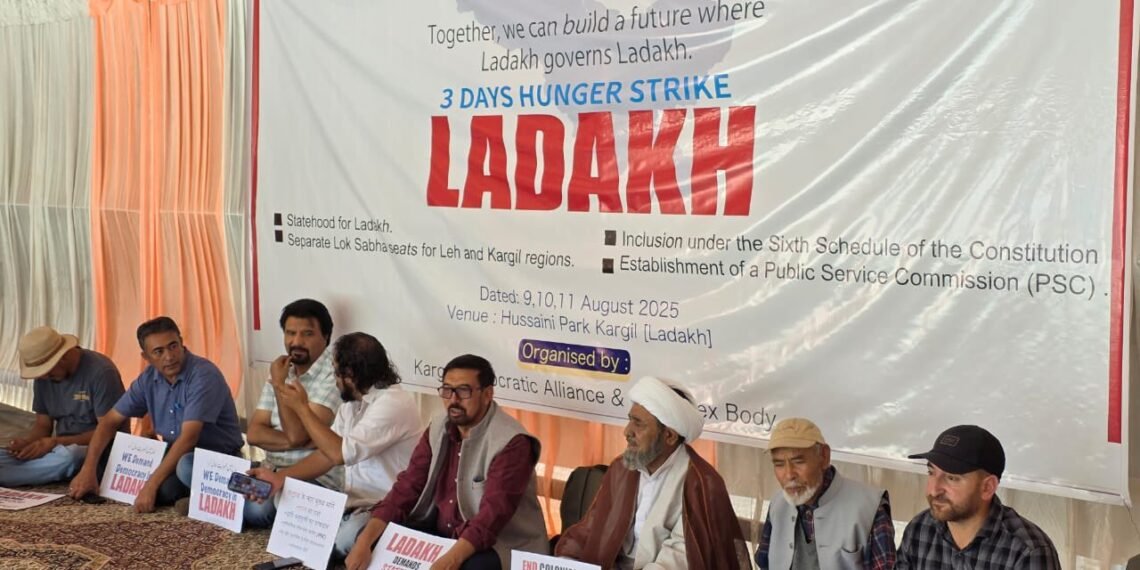The Kargil Democratic Alliance and Leh Apex Body launched a three-day hunger strike at Hussaini Park, demanding statehood and greater autonomy for Ladakh.
By PC Bureau
Frustrated by the Union government’s delay in resuming talks, the Kargil Democratic Alliance (KDA) and Leh Apex Body (LAB) intensified their five-year-long agitation with a three-day hunger strike that began on Saturday, August 9, at Hussaini Park in Kargil.The protest, set to continue until the evening of August 11, centers on four key demands: statehood for Ladakh, inclusion under the Sixth Schedule of the Indian Constitution, separate Lok Sabha seats for Leh and Kargil, and the establishment of a Public Service Commission (PSC).The hunger strike reflects growing discontent among Ladakh’s advocacy groups over the central government’s inaction.
The KDA, a coalition of political, religious, social, and trade organizations, and the LAB, representing Leh’s interests, have been spearheading this movement since Ladakh was reorganized as a Union Territory in 2019 following the revocation of Jammu and Kashmir’s special status.
Despite multiple rounds of discussions with the Ministry of Home Affairs’ High-Powered Committee (HPC), the groups say there has been no meaningful progress on their core demands.
A prominent banner at the protest site declared, “Together, we can build a future where Ladakh governs Ladakh,” encapsulating the groups’ vision for greater autonomy.
Protesters, including senior leaders like KDA co-chairman Asgar Ali Karbalai and Sajjad Kargili, carried placards with slogans such as “End colonial treatment, restore democracy” and “Statehood – Sixth Schedule and strong Ladakh.”
READ: Selective Silence? How TV Channels Muted Rahul’s Twin Attacks on ECI and BJP
The demonstration saw participants chanting slogans, underscoring their resolve to press for constitutional safeguards and political representation.
Karbalai, addressing the gathering, emphasized the urgency of the situation. “The hunger strike is part of our ongoing agitation supporting four key demands. Over the past four years, we have held strikes, fasts, protests, and foot marches to press for these rights,” he said.
He highlighted the lack of progress on statehood and Sixth Schedule inclusion, noting that a May meeting with HPC chairman and Minister of State for Home Affairs Nityanand Rai had promised discussions by June. “No such discussions have started yet, and it appears deliberate delays are being employed,” Karbalai added, warning that the entire Ladakh region is prepared to escalate the agitation if the government fails to respond.
The Sixth Schedule, enshrined in Articles 244(2) and 275(1) of the Indian Constitution, provides special provisions for the administration of tribal areas, offering protections for land, culture, and employment rights. Its implementation in Ladakh is seen as critical to safeguarding the region’s unique identity and resources. The demand for separate Lok Sabha seats for Leh and Kargil stems from the region’s vast geographical expanse—Ladakh is India’s largest Lok Sabha constituency by area, covering 173,266 square kilometers—yet a single parliamentary seat represents it.
A PSC, meanwhile, would ensure local recruitment and administrative autonomy.
Sajjad Kargili, another prominent KDA leader, criticized the government’s unfulfilled promises. “This colonial treatment should end with the people of Ladakh,” he said, calling for the restoration of democracy and constitutional protections. “We are protesting peacefully and democratically, and we hope this message reaches the government.”
The hunger strike has drawn significant local support, with senior political figures, including Ladakh’s lone MP, Mohd Hanifa Jan, joining the protesters.
The KDA and LAB have vowed to continue their agitation, with the core committees of both groups planning to meet soon to strategize further actions.
“The entire Ladakh is ready for this agitation, which will continue if the government fails to respond,” Karbalai warned.
The protest underscores broader concerns about centralized governance in Ladakh, which lacks a legislative assembly as a Union Territory.
The KDA and LAB argue that statehood and Sixth Schedule status would empower local communities to govern themselves and protect their cultural and environmental heritage amid increasing external pressures, such as industrial and solar policy initiatives that they insist must involve public consultation.
As the hunger strike enters its second day, the spotlight remains on the central government’s response—or lack thereof. For the people of Ladakh, this movement is not just about political demands but about securing a future where their voices shape their homeland’s destiny.














